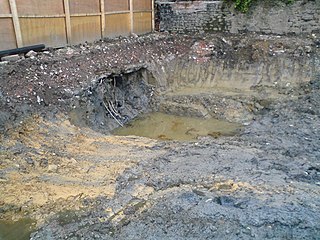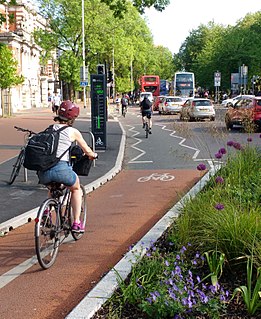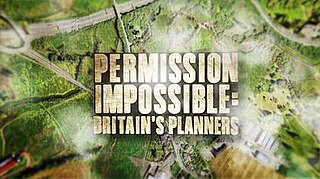 W
WAn Area of Outstanding Natural Beauty (AONB) is an area of countryside in England, Wales or Northern Ireland that has been designated for conservation due to its significant landscape value. Areas are designated in recognition of their national importance by the relevant public body: Natural England, Natural Resources Wales, or the Northern Ireland Environment Agency. In place of AONB, Scotland uses the similar national scenic area (NSA) designation. Areas of Outstanding Natural Beauty enjoy levels of protection from development similar to those of UK national parks, but unlike national parks the responsible bodies do not have their own planning powers. They also differ from national parks in their more limited opportunities for extensive outdoor recreation.
 W
WAn area of special scientific interest or ASSI is a conservation designation denoting a protected area in Northern Ireland. ASSIs are the equivalent of sites of special scientific interest (SSSIs) in the rest of the United Kingdom.
 W
WIn England, an asset of community value (ACV) is land or property of importance to a local community which is subject to additional protection from development under the Localism Act 2011. Voluntary and community organisations can nominate an asset to be included on their local authority's register of asset of community value.
 W
WIn urban planning, brownfield land is any previously developed land that is not currently in use that may be potentially contaminated. The term is also used to describe land previously used for industrial or commercial purposes with known or suspected pollution including soil contamination due to hazardous waste.
 W
WThe murder of Harry Collinson, the planning officer for Derwentside District Council, took place in 1991 at Butsfield, County Durham, England. At the time of the murder, the Derwentside District Council was involved in a dispute with Albert Dryden over the erection of a dwelling by Dryden in the countryside without planning permission. At approximately 9:00 am on 20 June 1991, as television news crews filmed, Dryden aimed a handgun—a .455 Webley Mk VI revolver—at Collinson and shot him dead. As the journalists and council staff fled, Dryden opened fire again, wounding television reporter Tony Belmont and Police Constable Stephen Campbell.
 W
WA communal garden is a garden for shared use by a number of local residents, typically in an urban setting. The term is especially used in the United Kingdom. The centre of many city squares and crescents are maintained as communal gardens.
 W
WA council garden estate is a housing estate planned and built for the rehousing of people from decaying inner city areas, pioneered by Ted Hollamby at Cressingham Gardens, Lambeth, in the 1960s. It was a reaction to the philosophy of Ernő Goldfinger, Lubetkin and Le Corbusier who saw a housing estate as an architectural monument. Hollamby sought an anti- monumental architecture, to design for the wishes and needs of the people. High density was achieved by pedestrianising the estate and having external car-parking
 W
WCounty Wildlife Site is a conservation designation in the United Kingdom, which despite conferring no statutory protection onto a site, does affirm a site's importance and value for wildlife in its county context. The designation is classified by Natural England as being a 'Local Site' designation, though sites can also be of a regional and national importance. Whilst the exact details of the selection process differ from county to county, in general local Wildlife Trusts, local authorities and other local wildlife/environmental/conservation groups collaborate to select and designate sites. Species in County Wildlife Sites are often also in that county's or the United Kingdom's national Biodiversity Action Plan.
 W
WCycling for transport and leisure enjoys popularity in Greater Manchester and the city also plays a major role in British cycle racing. The University of Manchester is home to the Manchester Cycling Lab.
 W
WA garden square is a type of communal garden in an urban area wholly or substantially surrounded by buildings and, commonly, continues to be applied to public and private parks formed after such a garden becomes accessible to the public at large. The archetypal garden square is surrounded by tall terraced houses and other types of townhouse. It is subtly distinguished from a public-access version throughout the existence of the square – the town square. Due to its inherent private history it may have a pattern of dedicated footpaths and tends to have considerably more plants than hard surfaces and/or large monuments.
 W
WGlobal Urban Research Unit (GURU) is a research centre established in 2002 at the School of Architecture, Planning and Landscape, Newcastle University, England.
 W
WIn British town planning, the green belt is a policy for controlling urban growth. The idea is for a ring of countryside where urbanisation will be resisted for the foreseeable future, maintaining an area where agriculture, forestry and outdoor leisure can be expected to prevail. The fundamental aim of green belt policy is to prevent urban sprawl by keeping land permanently open, and consequently the most important attribute of green belts is their openness.
 W
WThe Infrastructure Act 2015 is a wide-ranging piece of planning and infrastructure legislation passed by the Parliament of the United Kingdom during David Cameron's administration. The act targets "transport, energy provision, housing development and nationally significant infrastructure projects", and has been the subject of some degree of controversy.
 W
WAn overspill estate is a housing estate planned and built for the housing of excess population in urban areas, both from the natural increase of population and often in order to rehouse people from decaying inner city areas, usually as part of the process of slum clearance. They were created on the outskirts of most large British towns and during most of the 20th century, with new towns being an alternative approach outside London after World War II. The objective of this was to bring more economic activity to these smaller communities, whilst relieving pressure on overpopulated areas of major cities. The Town Development Act, 1952 encouraged the expansion of neighbouring urban areas rather than the creation of satellite communities. The authorities wished to divert people living in poor conditions within highly populous cities to better conditions on the outskirts of these cities. Overspill not only involves moving people to a new area, but requires industry and employment to follow. Often the industries and resources took longer to migrate than the people, hence there were a number of issues surrounding early overspill projects. Slum clearance tenants often had problems with the move, since it separated them from extended family and friends, needed services were often lacking, and only the better off workers could afford the extra cost of commuting back to their jobs. Another criticism was that the new estates occupied what had been productive agricultural land.
 W
WPermission Impossible: Britain's Planners is a British fly-on-the-wall television documentary series broadcast on BBC Two, which follows local council planning officers as they deal with applications for planning permission. It is the successor to The Planners.
 W
WPlanning permission in the United Kingdom is the planning permission required in the United Kingdom in order to be allowed to build on land, or change the use of land or buildings. Within the UK the occupier of any land or building will need title to that land or building, but will also need "planning title" or planning permission. Planning title was granted for all pre-existing uses and buildings by the Town and Country Planning Act 1947, which came into effect on 1 July 1948. Since that date any new "development" has required planning permission. "Development" as defined by law consists of any building, engineering or mining operation, or the making of a material change of use in any land or building. Certain types of operation such as routine maintenance of an existing building are specifically excluded from the definition of development. Specified categories of minor or insignificant development are granted an automatic planning permission by law, and therefore do not require any application for planning permission. These categories are referred to as permitted development.
 W
WThe Planning Portal is a website that was established by UK Government in 2002 to allow planning applications in England and Wales to be processed electronically. It later added guidance and information content, interactive guides, an application service for Building Regulations approval and the ability to purchase site location plans.
 W
WIn the United Kingdom, a scheduled monument is a nationally important archaeological site or historic building, given protection against unauthorised change.
 W
WA settlement hierarchy is a way of arranging settlements into a hierarchy based upon their population or some other criteria. The term is used by landscape historians and in the National Curriculum for England. The term is also used in the planning system for the UK and for some other countries such as Ireland, India and Switzerland. The term was used without comment by the geographer Brian Roberts in 1972.
 W
WA Site of Special Scientific Interest (SSSI) in Great Britain or an Area of Special Scientific Interest (ASSI) in the Isle of Man and Northern Ireland is a conservation designation denoting a protected area in the United Kingdom and Isle of Man. SSSI/ASSIs are the basic building block of site-based nature conservation legislation and most other legal nature/geological conservation designations in the United Kingdom are based upon them, including national nature reserves, Ramsar sites, Special Protection Areas, and Special Areas of Conservation. The acronym "SSSI" is often pronounced "triple-S I".
 W
WTowards an Urban Renaissance was a report written by the United Kingdom's Urban Task Force chaired by Lord Rogers of Riverside and published on 29 June 1999. It examined the question of how 4 million projected new homes over 25 years, might be accommodated in the UK without further encroachment into the green belt or other areas of countryside.